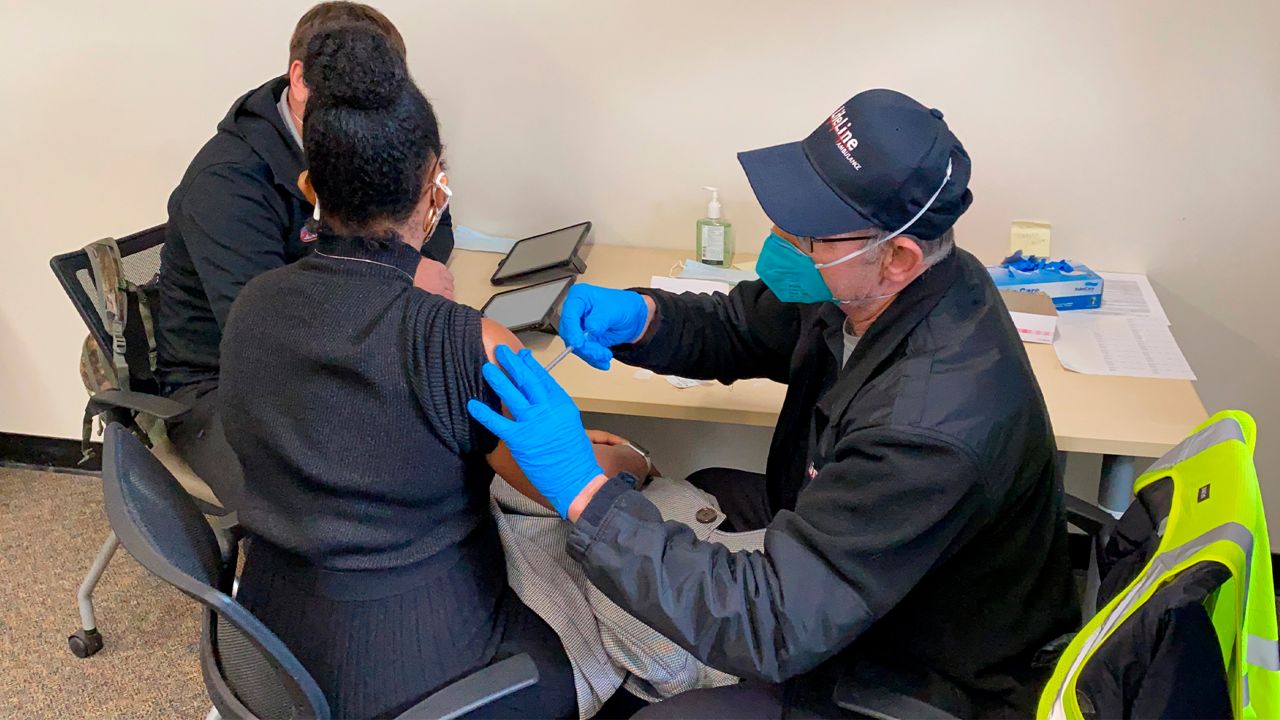LOS ANGELES — With the U.S. Food and Drug Administration on the cusp of granting emergency approval to the new Johnson & Johnson COVID vaccine, consumers are beginning to ask: should they be able to request a specific type?
“The question I get all the time is, 'Which vaccine should I get?’” said David Agus, chief executive of the Ellison Institute for Transformative Medicine at the University of Southern California Keck School of Medicine. “My answer for myself and for my family is, ‘I would get whichever you can receive the soonest.’ Every day sooner you’re vaccinated means one day sooner you're protected from this horrible virus.”
As of Thursday, 506,500 people had died from COVID in the U.S., almost 51,000 of them in California, according to Johns Hopkins University. While vaccinations are ramping up, their pace remains slow. Just 66 million doses have been administered so far, according to the U.S. Centers for Disease Control, from two manufacturers.
But a third is poised to join the mix. The U.S. Food and Drug Administration's vaccine advisory panel will vote Friday on whether to approve a new COVID vaccine from Johnson & Johnson and could authorize its use by Saturday. Earlier this week, the FDA said the Johnson & Johnson vaccine provided strong protection against death and severe disease from COVID and could also reduce the spread of the virus in those who had been vaccinated. It rated the vaccine’s overall efficacy at 72% and its protection against severe forms of COVID at 86% efficacy in the U.S.
That’s less than the Pfizer and Moderna vaccines, which are each rated at about 95% efficacy and are as effective in the real world as in clinical trials, according to a new study of more than 1 million people in Israel that was published in the New England Journal of Medicine this week. One week after the second dose, the vaccine was found to reduce symptomatic cases by 94% and severe disease by 92%, the study found. Like Moderna, the Pfizer vaccine is “quite effective” against the UK, South African, and Latin American variants. Both vaccines have been available since December but have remained in short supply.
“Do we have a right to choose? Of course,” Agus said, adding that vaccination sites are very transparent about the type of vaccine they’re using.
Just don’t expect that option at a vaccination site run by the L.A. County Public Health Department.
“We are not able to handle requests for different types of vaccine at any of the county sites,” a county public health official said in a statement to Spectrum News 1, adding that “Johnson & Johnson, if approved, will be approved as a highly effective vaccine able to effectively prevent severe illness and death associated with COVID-19.”
There are many advantages to the Johnson & Johnson vaccine. It requires ordinary refrigeration, takes effect with a single shot, and the side effects are more mild. The Pfizer and Moderna vaccines both require ultra-cold refrigeration and two shots separated by 21 to 28 days.
About 20 million doses of the Johnson & Johnson vaccine will be ready by the end of March, with an additional 80 million doses released by the end of June, according to the company’s testimony before Congress this week.
Pfizer and Moderna have so far delivered 80 million doses combined and have promised 140 million more doses by March 31.
In addition to the Pfizer, Moderna, and Johnson & Johnson vaccines, the FDA is likely to approve two additional types of two-dose vaccines by April: AstraZeneca-Oxford and Novavax. Like the other vaccines, they also have varying levels of efficacy.
The AstraZeneca-Oxford vaccine has an efficacy of 76% after the first dose and 82% following the second dose, according to clinical trials in the United Kingdom, Brazil, and South Africa, the company reported earlier this month. The trial also showed the vaccine’s potential to reduce asymptomatic transmission. While it may not be as effective against the South African variant, studies have found it is effective against the UK and Brazilian variants.
The Novavax vaccine showed efficacy of 89.3% in its Phase III trial in the United Kingdom and has proven effective against the UK and South African variants.
As for the Johnson & Johnson vaccine, the FDA noted it offered consistent protection across a spectrum of ages and ethnicities, but its efficacy dropped to 42.3% for people over the age of 60 with risk factors such as diabetes and heart disease.
That shouldn’t be cause for alarm, Agus said. “As you get older, your immune responses get weaker, so we make less immune response to a vaccine, no matter what vaccine,” he said. “In most cases, they provide enough protection so it’s not a big deal.”
The bigger deal, he said, is just to get the shot, whatever kind it might be. To achieve herd immunity, 70 to 80% of the population will need to be vaccinated. So far, just 6% of Americans are fully vaccinated, according to the U.S. Centers for Disease Control.
The American medical system “is very patient oriented,” said Mary Devereaux, assistant director of the Research Ethics Program at the University of California at San Diego. “We have a consumer mindset about patients and give people a lot of authority about what they want, but that’s only really appropriate with certain guidelines.”
The situation we’re now in with the vaccines is different, Devereaux said. “These are not ordinary times. We have over half a million dead from COVID.”
Offering people a choice, she said, “is just pragmatically, logistically, and certainly at this stage in the pandemic too difficult to do,” she said. “Ethically it’s problematic because what we need to do now is get everyone who’s entitled to a vaccine to get one as quickly as possible.”



